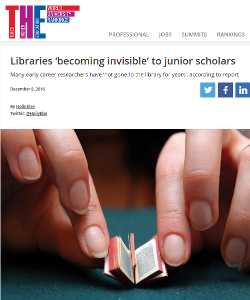
2017-01-25 17:45
How current and future users will access archives: you might not want to know a presentation by David Nicholas at a two day conference at Northumbria University Is there a democratic deficit in archives?
2016-12-11 17:12
Where RG falls down is regarding scholarly activities that do not concern pure research and so especially teaching. Its claim to have created a new way of measuring reputation is only partially true because if it wants to do so genuinely then it needs to extend the range of scholarly activities covered.
David Nicholas, Eti Herman, David Clark Scholarly Reputation Building — How does ResearchGate Fare? International Journal of Knowledge Content Development & Technology Vol.6, Nr.2, 67–92. December 2016
2012-12-08 11:43

CIBER's report on Early Career Researchers for the Publishing Research Consortium has attracted coverage in the THE
Many early career researchers have ‘not gone to the library for years’… “Their discovery systems have been bypassed by Google to a large extent, and to make matters worse their institutional repositories are not popular either. Libraries appear to have little to offer to the big new wave of researchers, so down the line there have to be worries for their long term future as resources for postdocs,” says the report
2016-12-04 20:55
Anthony Watkinson's report for the Academic Book of the Future project, The Academic Book in North America is concerned with what is different or special about the US academic scene in so far as it represents a context for the publishing of academic books.
The most obvious feature is the special nature of the 100 plus university presses. Their directors and staff see themselves as sharing a mission with their institutions and the academics whose scholarly communication they facilitate. To some extent this belief is bought into by many of those who write and talk about solutions to the continuing crisis in monograph publishing. What this means in practical terms is a concentration on a high quality of peer review and the decision-making role of an academic committee.
2016-11-29 16:50
Present practice still geared towards high impact journals, but future trends emerging.
ECRs, defined as researchers under 35 operating without tenure, are by far the largest group of researchers but there have been no recent investigations into their attitudes towards scholarly communication and the extent to which their behaviours may prove transformational. This report on data from year one of a planned three-year qualitative study investigates a wide range of hypotheses using personal interviews with 116 ECRs from seven countries (UK, US, China, France, Spain, Poland and Malaysia).
The year-one report: Early Career Researchers: the harbingers of Change?
2016-11-03 00:01
Early-career researchers constitute a vast pool of talent. They are the largest group of researchers and their numbers are growing fast. They are essential for enabling research to meet the needs of knowledge economies and, as the League of European Research Universities wrote in 2010, universities’ research crucially rests on their access “to the best talents of the rising generation and the creative influence of the irreverent young”.
Publish or perish thwarts young researchers’ urge to innovate Research Europe Nr. 440
2016-10-24 10:20
Anthony Watkinson is giving an early presentation on the first year results from the Harbingers project to the United Kingdom Serials Group in London on 15th November.
"The scholarly communications ecosystem: understanding and responding to evolving expectations" is the theme and Anthony will draw on recent work that discerns both potential and actual signs of changing attitudes in early career researchers, the academics of the future. In particular the tension between today's digital publication practice and established pressures implicit in climbing the academic ladder, with particular emphasis on sharing (or not), group dynamics, networks, platforms, and metrics.
2016-10-23 18:30
John Akeroyd will be presenting "Semantic enhancement: a library and publishing perspective" at the International Conference on Digital Libraries, New Delhi 13–16 December 2016.
John will also be contributing to Discovery and Discoverability: new ideas, techniques and products at Senate House, London 18th January 2017.
2016-10-17 09:45
The Scholarly Communications International Observatory (SCIO) studies scholarly communication in a global and digital market; topics such as: reputation, publishing, sharing, impact, information seeking, communications, social media, trustworthiness, and open science. The fundamental belief that underpins the Observatory is that scholarly communication and reputation is to be studied in a global context, but with a deep understanding of the national context.
2016-10-12 21:06
Dave Nicholas is speaking at the University of Coimbra, Portugal on 13 October on the subject of "Digital consumers: information seeking, reading, trustworthiness, social media, openness and more…".
2016-09-18 21:16
Dave Nicholas has been invited to present the results of his extensive research on scholarly reputation and bibliometrics to the Community of Practice on Composite Indicators and Scoreboards. This annual meeting is organised by COIN, part of the Joint Research Centre of the European Commission at Ispra (Italy). Bringing together scientific and analytical expertise that can be applied across policy areas, COIN is renowned for its expertise on statistical methodologies and has become a reference partner for the statistical audit of composite indicators.
The purpose of this one-day event is to bring together policy analysts and researchers from the European Commission, international organizations, think tanks and the academia, to foster a practical exchange of experiences across a wide range of key policy areas that are monitored through composite indicators and scoreboards.
New ways of building, showcasing, and measuring scholarly reputation will be presented on behalf of Professor Nicholas by co-author Blanca Rodríguez-Bravo.
2016-09-18 21:15
The first year of the Harbingers study has now reported —
1 Westwood Farmhouse
Greenham
Newbury
RG14 7RU
tel: +44 (0)1635 42719